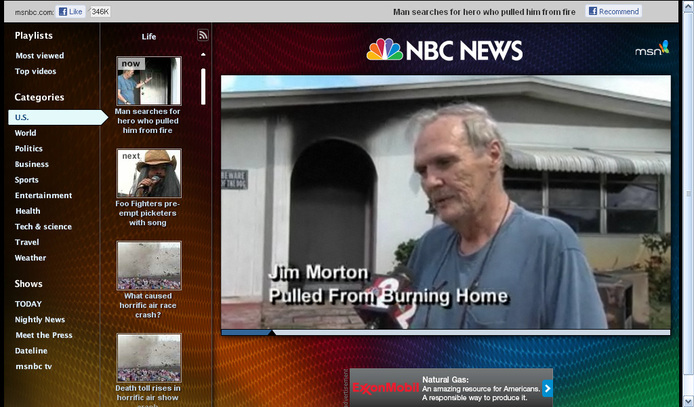
MSNBC's "Nightly News" on Monday told the story of Jim Morton, a man who was saved by a mysterious rescuer. How did the station's techniques line up with those we learned in "Writing for the Ear," on of Poynter Institute's online courses? Let's take a look.
The story is short: it's just one minute and seventeen seconds. It is probably for that reason that it uses only one scene; and takes only seven seconds to set it up. As the anchor and subjects are talking, we get to see more of the scene -- the man's charred house -- as B-roll.
Interestingly, the clip does exactly what "Writing for the Ear" says not to do; it ends with a quote. And yet, it works. For one thing, the story isn't one about a societal issue, with pro and con positions, so there's no danger taking sides, a danger Al Thomkins warned against in "Aim for the Heart." The story is also one of a single character — the rescued homeowner — so it makes sense to give him the final say.
Unfortunately, the ending is weakened by the last two seconds: careless editing has muted the man's words while continuing to show him talking. It's distracting and takes some of the force out of the closing "kicker" quote. Nonetheless, it is a good example of a "full circle": the man in the story brings it back to his search for the man who saved him.
The story is good, but not stellar. The quotes (Or as "Writing for the Ear" would say, Axx) tell the story, but they barely go beyond that. The quote it ends on is one of the better ones. I also noticed that the transitions were sometimes obvious a problem supposed to be avoided through judicious use of ambient noise and room tone. All this show me that MSNBC found an interesting story, but seemed to only tackle it half-heartedly.
The story is short: it's just one minute and seventeen seconds. It is probably for that reason that it uses only one scene; and takes only seven seconds to set it up. As the anchor and subjects are talking, we get to see more of the scene -- the man's charred house -- as B-roll.
Interestingly, the clip does exactly what "Writing for the Ear" says not to do; it ends with a quote. And yet, it works. For one thing, the story isn't one about a societal issue, with pro and con positions, so there's no danger taking sides, a danger Al Thomkins warned against in "Aim for the Heart." The story is also one of a single character — the rescued homeowner — so it makes sense to give him the final say.
Unfortunately, the ending is weakened by the last two seconds: careless editing has muted the man's words while continuing to show him talking. It's distracting and takes some of the force out of the closing "kicker" quote. Nonetheless, it is a good example of a "full circle": the man in the story brings it back to his search for the man who saved him.
The story is good, but not stellar. The quotes (Or as "Writing for the Ear" would say, Axx) tell the story, but they barely go beyond that. The quote it ends on is one of the better ones. I also noticed that the transitions were sometimes obvious a problem supposed to be avoided through judicious use of ambient noise and room tone. All this show me that MSNBC found an interesting story, but seemed to only tackle it half-heartedly.
 RSS Feed
RSS Feed